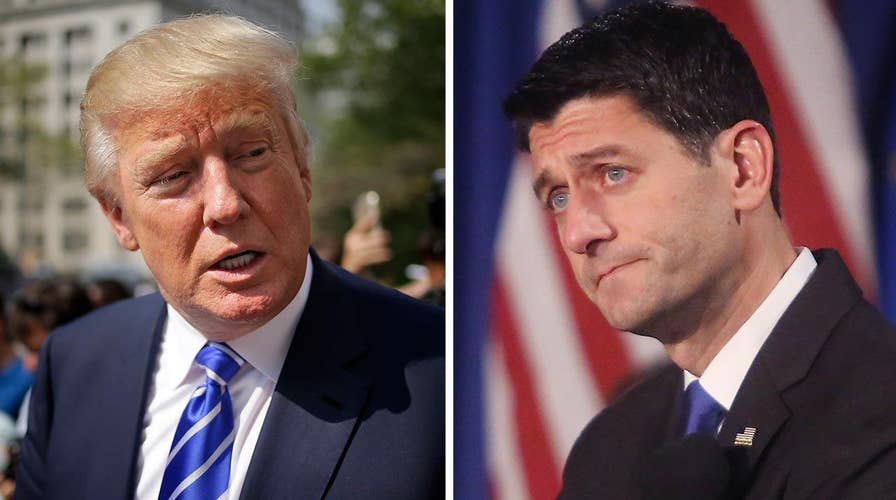Did Speaker Ryan misplay his dealing with Donald Trump?
The House speaker continues to keep his distance from the nominee despite facing blowback from many in the GOP; James Rosen has the story for 'Special Report'
When Rep. Paul Ryan of Wisconsin initially balked at accepting the House speakership last fall, it was widely understood that his biggest headaches would come from the staunchly conservative members of the Republican conference, such as the lawmakers in the Freedom Caucus, who had routinely made life miserable for Ryan’s predecessor, John Boehner.
Instead, as Ryan closes out his first year as the top elected Republican in Congress, he finds himself at odds with the Republican Party’s controversial nominee for president, and struggling to navigate intra-party tensions that make what Boehner endured seem quaint by contrast.
“Paul Ryan is my friend,” GOP vice presidential nominee Mike Pence said on “Fox and Friends.” “But honestly, I'd like to see Republican leaders supporting the Republican nominee for president of the United States.”
Pence’s comments came shortly before Ryan addressed a group of College Republicans in Madison, Wisconsin, the speaker’s home state and the latest setting for Ryan’s high-wire act, which sees him balancing obligations to down-ballot candidates with the traditional support a speaker offers to his party’s nominee.
Facing growing discontent among his own conference for his recent treatment of Trump – whom the speaker effectively abandoned on Monday, following the release of an old audio tape on which Trump could be heard making lewd comments about kissing and groping women – Ryan lashed out at Democratic nominee Hillary Clinton, calling her agenda for America “arrogant” and “condescending.”
In the America Clinton will refashion in her image, Ryan added, “There is no room to run, no chance to grow, or to fail for that matter. People are not needed, they are counted and sorted. This is how you can so casually classify whole groups of people as ‘baskets of deplorables.’”
In the same set of remarks, however, Ryan brandished the six-point policy plan that he and the GOP conference have developed over the course of the year and declared, “This is our party's vision for America” – a subtle but unmistakable assertion that Trump is not the face of today’s Republican Party.
And during the question-and-answer session, Ryan again appeared to keep his distance from the nominee: “I know many people are still making their choice. I know some people are avoiding making any choice at all. And I don't begrudge anybody for that.”
Trump, for his part, has alternated between vowing to work “arm in arm” with Ryan to defeat the “Obama-Clinton disaster" and blasting the speaker last Tuesday, in a Twitter post, as “weak,” “ineffective” and “disloyal.”
“If you sneeze, [Ryan] calls up and announces, 'Isn't that a terrible thing?'” Trump told Bill O’Reilly on “The O’Reilly Factor” that evening. “So look, I don't want his support, I don't care about his support.”
Ryan’s difficulties since taking office – manifest, for example, in the Republicans’ failure to bring a budget to the floor, an acute embarrassment for a speaker who formerly served as chairman of the budget committee – underscore the growing rift between GOP leaders and the GOP base. That rift was only magnified by the Republican electorate’s embrace of Trump in the primary season, when the real estate billionaire, a recent convert to conservatism, drew some 14 million votes, a record.
Republican leaders, however, have bristled at Trump’s mercurial style and ideological heresies, and have downright recoiled from his occasional use of vulgar language and the latest controversy to hit his campaign: the flood of allegations this week by women claiming Trump made unwanted sexual advances on them over the years, allegations the candidate has dismissed as lies.
Some have suggested that Ryan could have handled the difficult situation better; his disavowal of Trump on Monday, in response to the lewd audio recording, came on the day after Trump turned in a strong debate performance against Clinton and appeared, to many eyes, to have recovered from the controversy, or at least to have made up some lost ground.
“Paul Ryan didn't need to do that,” said Fred Barnes, executive editor of the Weekly Standard, in an interview for “On the Record” with Brit Hume on October 10. “You know who doesn't do that and I think probably has the same generally low opinion of Trump as Paul Ryan does? And that's Mitch McConnell, the Senate majority leader.”
Most analysts, however, see Ryan – whose speakership has also included some successes, such as resolution of the so-called “doc fix” hole in Medicare funding and a bipartisan measure addressing Puerto Rico’s debt – contending with singular challenges that even Boehner, toppled by opponents from within his own conference, did not have to confront.
“Ryan is having a terrible time in this Trump chokehold,” said A.B. Stoddard, associate editor and columnist at RealClearPolitics. “If he distances himself permanently and completely from Trump, he fears – and his members fear – Trump voters will not turn out. They'll come and only vote for the top of the ticket, they won't support down-ballot Republicans, and that could imperil the majorities in the House and the Senate.
“If he embraces him,” Stoddard added, “in a way to try to enthuse those voters – as more and more allegations of groping and other sort of scandalous revelations come to the fore – it makes it more likely there is a Democratic wave in the House, and Ryan could lose his majority that way. So he really is in an untenable position.”












































